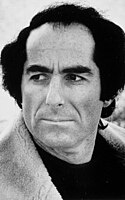Philip Roth Quote
That people were manifold creatures didn't come as a surprise to the Swede, even if it was a bit of a shock to realize it anew when someone let you down. What was astonishing to him was how people seemed to run out of their own being, run out of whatever the stuff was that made them who they were and, drained of themselves, turn into the sort of people they would once have felt sorry for. It was as though while their lives were rich and full they were secretly sick of themselves and couldn't wait to dispose of their sanity and their health and all sense of proportion so as to get down to that other self, the true self, who was a wholly deluded fuckup. It was as though being in tune with life was an accident that might sometimes befall the fortunate young but was otherwise something for which human beings lacked any real affinity.
That people were manifold creatures didn't come as a surprise to the Swede, even if it was a bit of a shock to realize it anew when someone let you down. What was astonishing to him was how people seemed to run out of their own being, run out of whatever the stuff was that made them who they were and, drained of themselves, turn into the sort of people they would once have felt sorry for. It was as though while their lives were rich and full they were secretly sick of themselves and couldn't wait to dispose of their sanity and their health and all sense of proportion so as to get down to that other self, the true self, who was a wholly deluded fuckup. It was as though being in tune with life was an accident that might sometimes befall the fortunate young but was otherwise something for which human beings lacked any real affinity.
Related Quotes
For everything in this journey of life we are on, there is a right wing and a left wing: for the wing of love there is anger; for the wing of destiny there is fear; for the wing of pain there is heali...
About Philip Roth
Roth was one of the most honored American writers of his generation. He received the National Book Critics Circle award for The Counterlife, the PEN/Faulkner Award for Operation Shylock, The Human Stain, and Everyman, a second National Book Award for Sabbath's Theater, and the Pulitzer Prize for American Pastoral. In 2005, the Library of America began publishing his complete works, making him the second author so anthologized while still living, after Eudora Welty. Harold Bloom named him one of the four greatest American novelists of his day, along with Cormac McCarthy, Thomas Pynchon, and Don DeLillo. In 2001, Roth received the inaugural Franz Kafka Prize in Prague.
